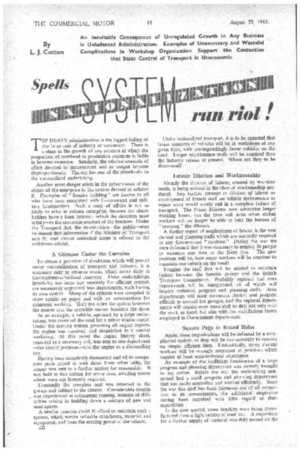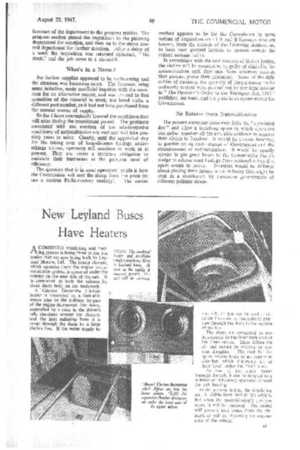An inevitable Consequence of Unregulated Growth in Any Business
Page 34

Page 35

If you've noticed an error in this article please click here to report it so we can fix it.
By is Unbalanced Administration. Examples of Unnecessary. and Wasteful L. J. Cotton Complications in Workshop Organization Support the Contention
that State Control of Transport is Uneconomic
TOP-HEAVY administration is the biggest failing of any large unit of industry or commerce. There is a stage in the growth of any concern at which the proportion of overhead to production expenses is liable to become excessive. Similarly, the relative amounts of effort devoted to management and to output become disproportionate. Therein lies one of the drawbacks to the nationalized undertaking.
Another great danger exists in the subservience of the object of the enterprise to the system devised to achieve it. Examples of "Empire building" are known to all who have been associated with Government and military headquarters. Such a state of affairs is not so likely to arise in private enterprise, because the shareholders have a keen interest—which the directors must satisfy—in the economic conduct of the business. Under the Transport Act, the shareholders—the public—may be denied that information if the Minister of Transport sees fit, and almost unlimited scope is offered to the ambitious official.
A Glimpse Under the Curtains
To obtain a pre-view of conditions which will prevail under _nationalization of transport and industry, it is necessary only to observe events which occur daily in Government-subsidized concerns. These undertakings, invariably too large and unwieldy for efficient control, are necessarily organized into departments, each having its own system. Many of the systems were compiled to show results on paper and with no consideration for economic working. Only too often the system becomes the master and the erstwhile master becomes the slave.
As an example, a vehicle, operated by a large undertaking, was taken off the road for a minor engine repair. Under the existing system governing all engine repairs, the engine was removed and despatched to a central workshop. At this point the engine history sheet, regarded as a necessary evil, was sent to one department —for record purposes—and the engine to a dismantling bay.
Having been completely dismantled and all its component parts mixed in with those from other units, the engine was sent to a further section for reassembly. It was held in this section for some time, awaiting spares which were not formerly required.
Eventually the complete unit was returned to the garage and refitted to the chassis. Considerable trouble was experienced in subsequent running, because of difficulties arising in bedding down a mixture of new and used spares.
A smaller concern could ill afford to maintain such a system, which wastes valuable man-hours, material and equipment, and loses the earning power of the vehicle.
A32 Under nationalized transport, it is to be expected that larger numbers of vehicles will be in workshops at any given time, with correspondingly fewer vehicles on the road. Larger maintenance staffs will be required than the industry retains at present. Where are they to be discovered?
Labour Dilution and Workmanship Already the dilution of labour, created by war-time needs, is being noticed in the class of workmanship produced. Any further attempt at dilution of labour or employment of female staff on vehicle maintenance or repair work would surely end in a complete failure of transport. The Prime Minister now advocates longer working hours, but the time will arise when skilled workers will no longer be able to bear the burden of " carrying " the dilutees.
A further aspect of employment of labour is the vast clerical and planning staffs which are normally required in any Government !' machine." During the war we were informed that it was necessary to employ 30 people to maintain one man in the front line. The new problem will be, how many workers will be required to maintain one vehicle on the road?
Imagine the staff that will be needed to maintain liaison between the humble garage and the British Transport Commission Probably regional and area departments, will be inaugurated, all of which will require technical, progress and planning staffs. Area departments will need numerous clerical and progress officials to control the garages, and the regional departments will require even more staff to deal not only with the work in hand, but also with the multifarious forms employed in Government departments.
Square Pegs in Round Holes
Again, these organizations will be defeated by a complicated system, as they will be too unwieldy to operate on simple, efficient lines. Undoubtedly, many clerical workers will be wrongly employed in positions which require at least semi-technical experience.
An example of the inefficient functioning of a large progress and planning department was recently brought to my notice. Before the war the undertaking concerned had a small progress and planning department that was easily controlled and worked efficiently. Since the war this staff has been increased out of all proportion to its commitments, the additional employees having been recruited with little regard to their capabilities.
In the case quoted, some brackets were being manufactured from a light section of steel bar. A requisition for a further supply of material was duly passed by the foreman of the department to the progress section. The progress section passed the requisition to the planning department for sanction, and then on to the stores control department for further sanction. After a delay of a week the requisition was returned endorsed, "No stock," and the job came to a standstill.
What's in a Name ?
No further supplies appeared to be forthcoming and the situation was becoming acute. The foreman, using some initiative, made unofficial inquiries with the storeman for an alternative supply, and was amazed to find quantities of the material in stock, but listed under a different part number, as it had not been purchased from the normal source of supply.
So far I have conveniently ignored the conditions that will arise during the transitional period. The problems associated with the erection of the administrative machinery of nationalization are vast and will take possibly years to solve. Clearly, until the appointed day for the taking over of long-distance haulage undertakings arrives, operators will continue to work as at present. They are under a statutory obligation to maintain their businesses at the previous level of efficiency.
The question that is in most operators' minds is how the Commission will sort the sheep from the goats (to use a curious Parliamentary analogy). The easiest method appears to be for the Commission to serve notices of acquisition on all A and B licensees who are known, from the records of the Licensing Authorities, to have been granted licences to operate outside the critical mileage radius.
In accordance with the new concept of British justice, the victims will be assumed to be guilty of eligibility for nationalization until they can, from whatever records they possess, prove their innocence. Some of the difficulties of assessing the quantity of long-distance traffic ordinarily carried were pointed out by our legal adviser in "The Operator's Guide to the Transport Act, 1947," published last week, and are plain to everyone except the Government.
No Release from Nationalization The present economic crisis may defer the "appointed day" and allow a breathing space in which operators can gather together all the available evidence to support their claims to freedom. It would be unwise, however, to gamble on an early change of Government and the abandonment of nationalization. It would be equally unwise to pin great hopes to the Conservative Party's pledge to release road haulage from nationalization if it
again comes to power. Investors would be diffident about placing their money in an industry that might be used as a shuttlecock by successive governments of different political shades.
















































































